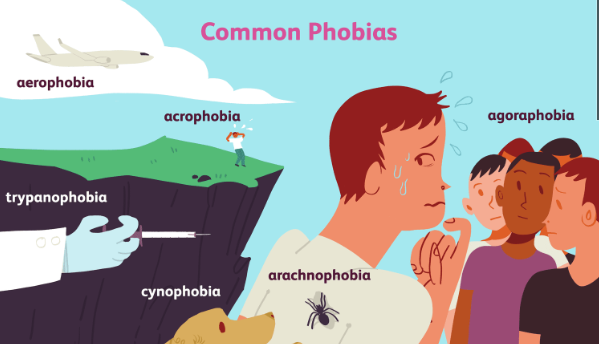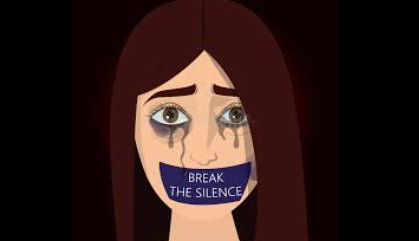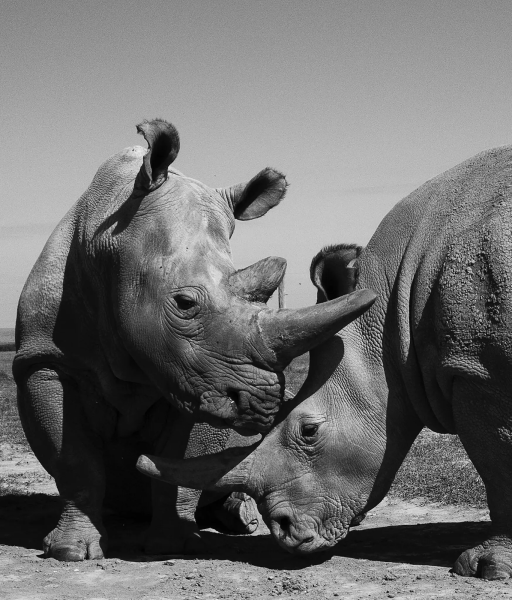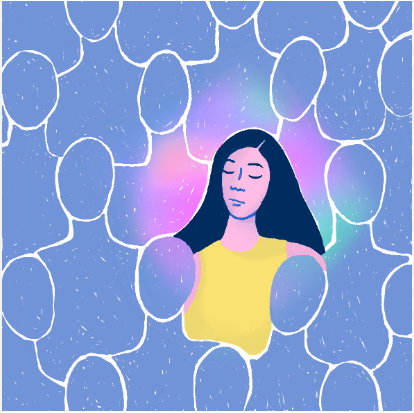Phobias – How are we Affected?

Phobia is a word meaning the extreme fear or dislike of something. This is used for pretty much anything imaginable from arachnids (arachnophobia) to pretty women (venustraphobia). Now most of these phobias are pretty rare like hemophobia (the fear of blood), but some like anthropophobia (the fear of people or society) seem to show up here and there in people. Those are a few of the many, many types, and this article is here to shed some more light on what may be going on in people’s minds when they have these fears. Anyone could have a fear for no reason, but many who have phobias get it from some childhood trauma, or something else later in life.
Phobias have a chance to form from genetics. An article by Verywellmind on phobias infers, “A difficult, stressful, or traumatic experience can also trigger the onset of a phobia. For example, being bitten by a dog as a child might trigger a fear of dogs in adulthood.” Some people have their fears because of something specific. Someone could be afraid of crossing a road because they were hit by a car once. Sometimes phobias just appear out of nowhere, or are passed down by genetics. Again, by Verywellmind, they illustrate, “People with a close family member with a phobia or another anxiety disorder also have a greater risk of a phobia. It is important to note, however, that people who don’t have family members with the condition still develop phobias.” Knowing any of this won’t help anyone to avoid getting a phobia, but it could help people find out why they have one.
There are all kinds of phobias, but how does it feel to have one of these bizarre phobias? Piper Street, is known to have Sidonglobophobia (phobia of cotton balls), and when asked how it affected their everyday life they said, “It doesn’t really but it definitely affects me more when having to use them in school projects.” When asked how they felt when interacting with cotton balls they stated, “I get like chills, kind of like sensory issues.” The interview started to get more jittery when Piper had to think about their phobia longer.
People with phobias have different reactions with these fears, some may feel light headed, others may have faster heartbeats. An article on these symptoms of phobias by NHS lists, “People with phobias can have panic attacks. These can be very frightening and distressing. The symptoms often occur suddenly and without warning. As well as overwhelming feelings of anxiety, a panic attack can cause physical symptoms, such as: sweating, trembling, hot flushes or chills, shortness of breath or difficulty breathing, a choking sensation, rapid heartbeat (tachycardia), pain or tightness in the chest, a sensation of butterflies in the stomach, nausea, headaches and dizziness, feeling faint, numbness or pins and needles, dry mouth, a need to go to the toilet, ringing in your ears, confusion or disorientation” If people start to have any of these symptoms when looking at something, or when picturing something, they shouldn’t worry it’s pretty normal, and it won’t kill you in small amounts. People should stay away from what causes these symptoms and fears.
Even some of the more common phobias aren’t felt between a huge variety of people, and most people without the phobia won’t know how it feels to have it. Dawnie-Cat Gardiol, who is known to have arachnophobia (phobia of spiders) responded to the same questions Piper was given. When asked about how they felt when seeing a spider they explained, “I feel like my soul left my body and I would want to run. But if I’m stuck in the same room then I would freeze and my heart would race.” Again with Dawnie-Cat, as the interview went on the more they thought about the fear, but this time it allowed them to explain it in more detail.
People express their fears and phobias in many different ways, and it’s completely normal for people to be afraid, or scared of something. If people weren’t afraid of something then our world would be a lot different because anyone and everyone can, and will be afraid at least one time or another in their life. All people should be respected for their differences and be understood. There is no point in exploiting one’s fear for another’s gain. Especially if that is for bullying purposes.











